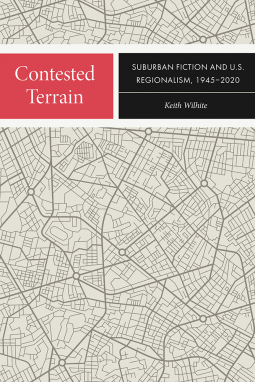
Contested Terrain
Suburban Fiction and U.S. Regionalism, 1945-2020
by Keith Wilhite
This title was previously available on NetGalley and is now archived.
Send NetGalley books directly to your Kindle or Kindle app
1
To read on a Kindle or Kindle app, please add kindle@netgalley.com as an approved email address to receive files in your Amazon account. Click here for step-by-step instructions.
2
Also find your Kindle email address within your Amazon account, and enter it here.
Pub Date Dec 01 2022 | Archive Date Dec 01 2022
University of Iowa Press | University Of Iowa Press
Talking about this book? Use #ContestedTerrain #NetGalley. More hashtag tips!
Description
LITERARY CRITICISM / SCHOLARLY
Contested Terrain explores suburban literature between two moments of domestic crisis: the housing shortage that gave rise to the modern era of suburbanization after World War II, and the mortgage defaults and housing foreclosures that precipitated the Great Recession. Moving away from scholarship that highlights the alienating, placeless quality of suburbia, Wilhite argues that we should reimagine suburban literature as part of a long literary tradition of U.S. regional writing that connects the isolation and exclusivity of the domestic realm to the expansionist ideologies of U.S. nationalism and the environmental imperialism of urban sprawl. Wilhite produces new, unexpected readings of works by Sinclair Lewis, Lorraine Hansberry, Richard Yates, Patricia Highsmith, Don DeLillo, Jonathan Franzen, Jeffrey Eugenides, Chang-rae Lee, Richard Ford, Jung Yun, and Patrick Flanery. Contested Terrain demonstrates how postwar suburban nation-building ushered in an informal geography that recalibrated notions of national identity, democratic citizenship, and domestic security to the scale of the single-family home.
Advance Praise
“Keith Wilhite’s trenchant study of the literature of the U.S. suburbs is defined by a sophisticated critical understanding of regionality and regional writing. Vitally, Contested Terrain illuminates how post-1945 authors have interrogated the suburbs’ complex enmeshment within local, national, and global projects and processes.”—Martin Dines, author, The Literature of Suburban Change: Narrating Spacial Complexity in Metropolitan America
“Keith Wilhite’s Contested Terrain achieves the near impossible. Tracing the evolution of suburbia from the first federally funded subsidies through the 2008 recession and beyond, it rescues a term pejoratively associated with provincialism to redefine suburbia as our primary noncontiguous national region. In making its case, by way of established and relatively new writers, ethnically diverse writers, and writers working in different genres, the book offers a superb cross section of what American writing over the last seventy-five years actually looks like.”—Stacey Olster, author, The Cambridge Introduction to Contemporary American Fiction
Available Editions
| EDITION | Other Format |
| ISBN | 9781609388577 |
| PRICE | $92.50 (USD) |
| PAGES | 280 |
Links
Average rating from 2 members
Featured Reviews
 Mandy J, Reviewer
Mandy J, Reviewer
Not an easy read, and certainly an academic text rather than one for the general reader, but nonetheless an accessible one and well worth the effort. It’s an exploration and examination of what can be loosely termed “suburban” literature, and the author argues that in a literary context the suburbs are not just the locale of repression and conformism but are in the rich tradition of American regional writing. Not a quick read, either, but an invaluable resource for readers wanting to examine some key novels from a different viewpoint. My TBR now has a good few new titles on it, plus new insights into the ones I was already familiar with. A book to be kept and referred to in the future.



